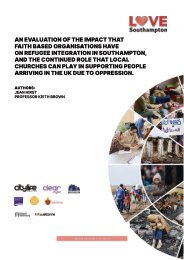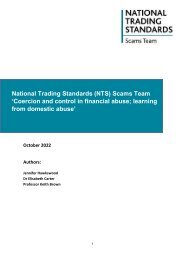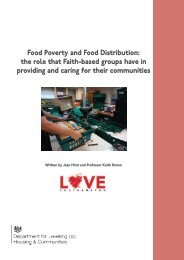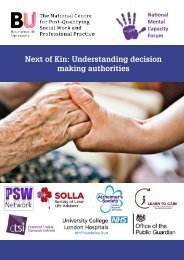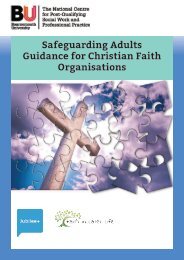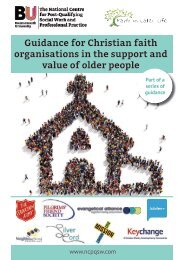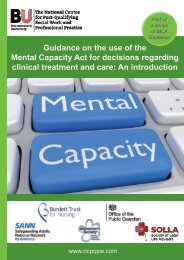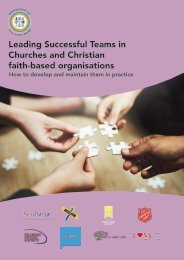Loneliness in Older People - Online
Some of the isolation and loneliness which people in the Fourth Age experience is due to the ageism in our society and in our churches. It is now time for churches to stand-up to the prejudices and discrimination of older people, to challenge the ageism we see in society and show that people in the Fourth Age are valued, celebrated, respected and included. Churches and Christian faith organisations should be leading the way to reach out to older people, to tackle ageist views and attitudes and demonstrate that older people matter.
Some of the isolation and loneliness which people in the Fourth Age experience is due to the ageism in our society and in our churches. It is now time for churches to stand-up to the
prejudices and discrimination of older people, to challenge the ageism we see in society and show that people in the Fourth Age are valued, celebrated, respected and included. Churches
and Christian faith organisations should be leading the way to reach out to older people, to tackle ageist views and attitudes and demonstrate that older people matter.
You also want an ePaper? Increase the reach of your titles
YUMPU automatically turns print PDFs into web optimized ePapers that Google loves.
Mission and m<strong>in</strong>istry to combat lonel<strong>in</strong>ess -<br />
a spiritual and pastoral approach<br />
Provid<strong>in</strong>g pastoral support to older people who may be struggl<strong>in</strong>g with lonel<strong>in</strong>ess <strong>in</strong> later life<br />
creates opportunities for mission and m<strong>in</strong>istry for Christian faith organisations. There is a huge<br />
potential for mission amongst older people – reach<strong>in</strong>g out to spread the good news of the<br />
Gospel to older people who have no faith, but for whom there may be less time to respond to<br />
the Gospel message. Many older people who have had little or no contact with churches dur<strong>in</strong>g<br />
their younger years may be <strong>in</strong> a position to listen, reflect, believe and accept the love of Jesus<br />
<strong>in</strong> their Fourth age. At a time <strong>in</strong> their life with fewer pressures, demands and expectations than<br />
their youth, middle age and even early retirement, those liv<strong>in</strong>g <strong>in</strong> their Fourth age may be able<br />
to re-evaluate their own life; they may be <strong>in</strong> a position re-set their priorities and commitments,<br />
be less materialistic and self-centred and more appreciative of spiritual guidance, acceptance of<br />
pastoral m<strong>in</strong>istry and open to the message of the gospel.<br />
Churches play an important role <strong>in</strong> support<strong>in</strong>g older people with the spirituality of age<strong>in</strong>g.<br />
Enabl<strong>in</strong>g and encourag<strong>in</strong>g those <strong>in</strong> the Fourth age to reflect and rejoice; to let go of issues,<br />
relationships or difficulties which may have caused pa<strong>in</strong> <strong>in</strong> the past. Prayer and pastoral care<br />
to those <strong>in</strong> later life are important aspects of the spiritual support older people need. So too<br />
is fellowship, with praise and thanksgiv<strong>in</strong>g - to celebrate life <strong>in</strong> the Fourth age and be thankful.<br />
Churches can also encourage and enable older people to focus on the positive gifts of later life<br />
and provide opportunities for spiritual heal<strong>in</strong>g from anyth<strong>in</strong>g <strong>in</strong> life which may have caused hurt<br />
or damage.<br />
Meet<strong>in</strong>g the spiritual and pastoral needs of older people is a good way to offer the love of<br />
Jesus and share the messages of the Gospel. Many people liv<strong>in</strong>g <strong>in</strong> the Fourth age may have<br />
been to Sunday school as a child, attended church for festivals and ceremonies and have a<br />
basic knowledge of the Bible and psalms. However, some may never had had the opportunity<br />
to really hear the Gospel or consider a personal relationship with God. Be<strong>in</strong>g <strong>in</strong>vited to a<br />
church activity, service or group may be the only <strong>in</strong>vitation an older person receives to a social<br />
engagement – learn<strong>in</strong>g about and be<strong>in</strong>g <strong>in</strong>troduced to Jesus may be the greatest opportunity an<br />
older person receives to make the greatest of friends.<br />
A study by Rote et al. (2013) found that “religious attendance was associated with higher<br />
levels of social <strong>in</strong>tegration and social support ….results suggest that <strong>in</strong>volvement <strong>in</strong> religious<br />
<strong>in</strong>stitutions may protect aga<strong>in</strong>st lonel<strong>in</strong>ess <strong>in</strong> later life by <strong>in</strong>tegrat<strong>in</strong>g older adults <strong>in</strong>to larger and<br />
more supportive social networks”. The National Academies of Sciences (2020) also found that<br />
those with <strong>in</strong>volvement <strong>in</strong> religious activities held strong religious beliefs, and active members of<br />
religious groups felt less lonely than those without any <strong>in</strong>volvement <strong>in</strong> faith organisations.<br />
The Covid-19 pandemic also brought opportunities for churches and other Christian faith<br />
organisations to step-up, to recognise the need for those <strong>in</strong> their communities – <strong>in</strong>clud<strong>in</strong>g older<br />
people. The lockdown measures helped people appreciate what it is like to go for many days<br />
without see<strong>in</strong>g another person, to manage without the convenience of a car or access to a large<br />
supermarket and only be able to make contact with family through the phone or <strong>in</strong>ternet. The<br />
lockdown measures also enabled churches and other Christian faith organisations to th<strong>in</strong>k<br />
differently about how they work, consider their priorities and recognise the importance of<br />
personal pastoral work.<br />
23 | <strong>Lonel<strong>in</strong>ess</strong> <strong>in</strong> <strong>Older</strong> <strong>People</strong>







